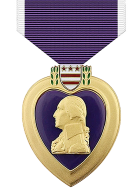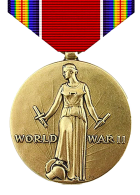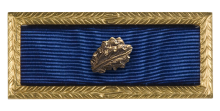We emplaned on the evening of June 5th. The air armada flew into the Atlantic to a rendezvous radio signal on a submarine. Then we turned east toward the coast of the Cotentin Peninsulla. I slept until someone awakened me. I looked out just as we crossed the beach. Lt. Alderton was our jumpmaster and wanted me to jump immediately behind him. At first we flew through a thick fog or dense smoke. Leaving the smoke, puffs of antiaircraft explosions and colorful streams of machinegun fire greeted us. The German tracers were red, blue and green. American tracers were only one color. Every now and then, a bullet would zip through the floor and out the top of the plane. The port engine caught fire and flames flashed by our jump door. Apparently the fire extinguisher doused the flames and the engine continued. Then the starboard engine caught fire at about the same time that we saw the green light. The green light signal to JUMP! It was about 2:20AM.
I jumped after Alderton and observed a German fighter plane following, firing at our C-47. (After returning to England, General Eisenhower let us check on the status of our plane…it didn’t make it back.) We jumped at what I estimate was less than 300 feet, because I oscillated only once before hitting the deck. I was fired upon by machine gun on the way down. I was cutting my harness off with my trench knife when a machine gun opened up again. I accidentally dropped my knife and hauled ass down a road. A German challenged me: HALT! I jumped into the gutter and ditched the anti-tank mine that was slowing me down. Two Germans chased after me, firing their rifles. I came to an eight-foot fence and ran through an open gate.
The German soldiers were on the road in plain sight about twenty feet away. I should have killed them both, but we had been ordered not to fire until daybreak. So I fixed the bayonet on my rifle, expecting them to follow me. I knew that I could take them both since the gate was only wide enough to let one through at a time. However, they wouldn’t leave the road and I got tired of waiting for them and left the area. Next I found Richard Guscott who had oscillated into a stonewall, bruising his ribs. I hid him in a hedgerow and promised to return for him. Later I found Joe Sienko and several other guys. I told Joe to go open an equipment bundle out in the field. He gave me a blank, “1000 yard stare” so I slapped him with an open hand. “When I say move, go!” I shouted at him. He moved.
We set up two machine guns, a mortar, a case of grenades and plenty of ammunition in a dug-in German position. By then, it was daylight so I told the guys that I was going to find Guscott. After walking only fifty yards, an MG42 opened up on me. Winston Churchill said after the Boer War, “There’s nothing more exhilarating than to be shot at unsuccessfully!” I suppose I felt that same exhilaration, but I was too busy hitting the ground and scanning for the source of the gunfire to notice it. I saw two 500-pound bomb craters in the middle of a large open field. The machine gun’s presence indicated that there was probably a squad of ten men in one of the two craters. I placed an extra clip of eight rounds in front of me. This would give me sixteen shots in case they rushed me.
I heard a noise behind me. Turning around, I saw a German Sergeant pointing a Schmeisser machine pistol at me. I stood and put up my hands, while nine Germans came out of the closer crater. The young blond who fired at me was shaking like a leaf. No wonder he missed me! Looking back at my men, I thought that if I took the machine gun away from the German and hit the ground, my guys could open fire on them. However, all I saw were the backs of their helmets. Their attention was elsewhere.
The Germans escorted me to a small building where a group of captured American paratroopers were already assembled. I was really happy to see Guscott, but not necessarily under those circumstances! A German lieutenant who spoke perfect English came in and asked for everyone’s names. After Louis Pfeiffer gave his name, he asked if Pfeiffer spoke German. Pfeiffer lied to him saying, “No.” When he got to me, I gave him my name, rank and serial number. He saw my sergeant stripes and asked how many paratroopers jumped in France. I told him loudly, “Look, Bud, I told you my name, rank and serial number and that’s all I’m gonna tell you.” I was trying to impress everyone to reveal only the required information. We had been warned not to lie to the Germans. We were told that they were smart and if several men lied, the Germans would be able to sort out the lies and come up with the truth.
The German lieutenant looked at me, red-faced, clicked his heels and said, “Stand at attention when you speak to a German officer, and don’t call me ‘Bud’!” I refused to stand at attention and just glared at him with folded arms. He sputtered, “Turn around and face the wall!” Turning away slowly with my eyes on him, I unzipped the secret pocket on my chest and held my switchblade in my hand. The lieutenant turned and spoke to the guard. I thought he was telling the guard to shoot me. If the guard had raised his rifle, I was going to cut the guard’s throat. He didn’t shoot me, the lieutenant left, and I sat down next to Guscott. Gus was trying to light a cigarette, but the guard came and slapped it out of his hand and confiscated the cigarettes.
We were taken outside and ordered to empty our pockets onto tables. I complied, but there was so much confusion, I walked back around the table and put everything back into my pockets. They took us out on the road and we started walking. When American P47s flew over, the Germans would jump down in the ditches lining the road. They shouted at us, “Langsam!” (Walk slowly!) I’d tell the guys to walk fast and we’d leave them behind fighting weeds in the ditches. The officer heard me and jabbed me in the ribs with his Schmeisser. After the P47s had passed, they’d get back on the road and tell us, “Mach schnell!” (Walk fast!) I whispered for our guys to slow down again the officer jabbed me in the ribs and told me shut up.
I worked my way up to our lieutenant to suggest that we overtake the Germans. There were only eight of them and about forty of us. Except for the German officer who was jabbing me with his gun, all the other Germans had their rifles slung. I suggested that the next time he jabbed me, I take his head off. Our lieutenant replied, “The war is over for us.” This was the only time that I felt depressed during the war. I had such respect for our officers, especially this one! He was a handsome, athletic guy and a great leader. One time I saw him give his reserve chute to Andy Peluso. Andy accidentally pulled his reserve, splitting the silk all over the floor of the plane…just as we were about to make a practice jump. The lieutenant then led the stick out without a reserve. That took more nerve than I had. His statement when we captured then, made no sense to me. It had never entered my head that we wouldn’t be successful and win the war. In retrospect I’ve decided he must have believed that we might not be successful and some of us would be killed. I decided right there that when the opportunity presented itself, I would have to plan to escape alone.
I suffered a slight ankle injury on the jump so I limped all day. I exaggerated its severity because I knew the enemy tends to believe your spirit is broken if you are injured, and they’ll be able to control more easily. I also knew they wouldn’t watch you as closely. We walked through Valognes and I could see the French were unhappy to see so many American prisoners. This was encouraging to me because I knew that when I escaped, the French would help. We marched through town to a big chateau where, they herded us into a chateau courtyard where perhaps two hundred, paratroopers were gathered. Another German officer ordered everyone from the 82nd to go to an area to his left, and the 101st soldiers to go to another area. Of course, no one cooperated. The officer then inspected arm patches and directed each guy to the area he had designated. When he approached me in the front row, I put on my best “theatrical limp.” He asked if I were wounded, I replied, “I think I broke my ankle on the jump.” He told me to go sit against a building. I obeyed.
He directed more 82nd guys in my direction and I soon realized that I couldn’t see the guards…and they couldn’t see me! I crawled into the doorway of the barn, pulled an old wooden butter tub, some rakes, shovels and hoes over me. I removed my bright 82nd shoulder patch. My American flag patch was on my right shoulder, away from the door. I heard them counting excitedly. One German came into the barn and seemed to look directly at me. He left without seeing me. (Months later, I learned from Horace Pendergrass after he escaped, that a young soldier, Harry Dover, saw me crawl into the barn and followed. They beat him in the head with rifle butts. His wife later told me that he had gone blind and committed suicide.)
I heard the officer say that anybody who tried to escape would be shot. Then he said they were going to feed everybody. I was so hungry; I was tempted to postpone my escape. Toward dusk, I crawled out to an open area of the barn. All of the paratroopers were in a barbed wire cage with machine guns mounted on swivels at each end so the cage could be swept in a moment’s notice. I was lying there, trying to figure how to get the paratroopers loose, when a command car drove up. I looked out and saw a German general and his beautiful blonde French girlfriend.
Before dark, they placed more guards on the chateau and I realized it would be impossible for me to gain access. I tried to go out the back door of the barn. As soon as I got out on the street, I had to retreat because gangs of drunken Germans were coming from town. It puzzled me because they weren’t speaking German. [I discovered fifty years later while in Valognes, that they were Georgians (Russians) who had been impressed into the German Army.] I went back into the barn to survey an alternate escape route. The only way out was to cross in sight of two guards. I watched them for a long time in order to see how they walked their posts. I could see no pattern. I had to take a chance. I crawled out on an open lawn, taking what seemed like ages to get to a four foot wooden picket fence next to a tree. The closer guard came within ten feet of me as I climbed up on the fence with my head and shoulders in the tree.
Slowly turning my head, I realized that he had stopped and was looking directly at me. That’s where my training paid off. In our training games, we learned that the first man who moved was dead. After a seeming eternity, he turned and continued walking his post. I dropped down and moved toward town, scaling several stonewalls that divided the apple orchards. I tried eating an apple but its bitter taste forced me to spit it out. The Krauts made an error, letting me escape. Later I had 27 sure kills. Coincidentally, I had 27 parachute jumps including Normandy and the Rhine jumps. We spent two months in the “Bulge,” but we “jumped” out of cattle trucks around Bastogne for that battle.
Finally, at dawn, I dropped inside the churchyard. All was quiet as I entered a small building alongside the church. On a table were a bottle of wine and half a loaf of French bread. I finished them quickly before I realized it was probably the host and wine for Mass. After that quart of wine, I was willing to take on the entire German Army.I walked into the large room under the church and found a room full of sleeping kids and two nuns, who bolted upright in bed. Then I made my first mistake of the day. I said, “Je suis americain.”
They thought I spoke French and replied in French. I interrupted them saying, “No parlez francais.” They brought an English speaking Frenchman and the priest. I told them I’d just escaped and asked to be hidden. They said, “Sergeant, if they find you here, they’ll kill all of us.” So I thanked them and started to walk out. (I learned fifty years later that the town had been occupied by an S.S. Panzer Division.) The Frenchman said to follow him and hid me in a barn in the back of the churchyard. He was preparing to leave when I told him, “Mangez!”
He brought me a poor boy sandwich and a bottle filled with milk. I climbed up in the hay and went to sleep. I heard P-47s overhead, it was 2PM. and I’d had a good nap. The planes were going after the tanks that were nestled near the church. Each P-47 had two 500-pound bombs. The third bomb blew all the shingles off the roof of my building. I now had a seat on the 50-yard line. In total there were eight P-47s that dropped 16 bombs. When the moon went in at 11PM, the Frenchman brought me a map and showed me where the Americans were. I asked him if he had a weapon for me, but he didn’t. I asked permission to take a hatchet I’d spied in the churchyard. He nodded. I went to war with a hatchet.
I crossed a road that was loaded with traffic. After I made it across, I headed south on the railroad tracks. I walked along a branch of a river and heard coughing all along the tree-lined banks. My imagination pictured a whole German Army coughing, but daylight proved it to be cows coughing up their cuds. Did I feel foolish at daybreak!
George H. Leidenheimer










